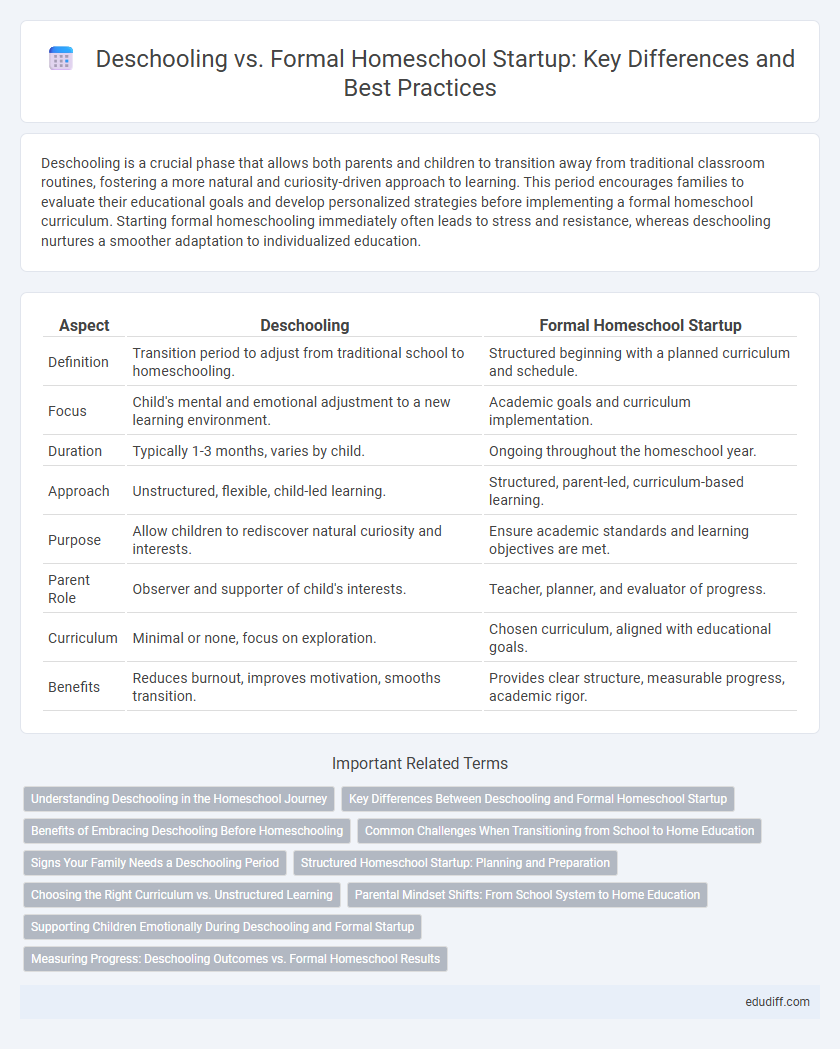Deschooling is a crucial phase that allows both parents and children to transition away from traditional classroom routines, fostering a more natural and curiosity-driven approach to learning. This period encourages families to evaluate their educational goals and develop personalized strategies before implementing a formal homeschool curriculum. Starting formal homeschooling immediately often leads to stress and resistance, whereas deschooling nurtures a smoother adaptation to individualized education.
Table of Comparison
| Aspect | Deschooling | Formal Homeschool Startup |
|---|---|---|
| Definition | Transition period to adjust from traditional school to homeschooling. | Structured beginning with a planned curriculum and schedule. |
| Focus | Child's mental and emotional adjustment to a new learning environment. | Academic goals and curriculum implementation. |
| Duration | Typically 1-3 months, varies by child. | Ongoing throughout the homeschool year. |
| Approach | Unstructured, flexible, child-led learning. | Structured, parent-led, curriculum-based learning. |
| Purpose | Allow children to rediscover natural curiosity and interests. | Ensure academic standards and learning objectives are met. |
| Parent Role | Observer and supporter of child's interests. | Teacher, planner, and evaluator of progress. |
| Curriculum | Minimal or none, focus on exploration. | Chosen curriculum, aligned with educational goals. |
| Benefits | Reduces burnout, improves motivation, smooths transition. | Provides clear structure, measurable progress, academic rigor. |
Understanding Deschooling in the Homeschool Journey
Deschooling is a crucial phase in the homeschool journey that helps children transition from traditional classroom mindsets to self-directed learning. It involves a period of unstructured time allowing students to rediscover curiosity, creativity, and intrinsic motivation without the constraints of formal schooling schedules. This approach contrasts with formal homeschool startup methods that emphasize structured curricula and scheduled lessons from the outset.
Key Differences Between Deschooling and Formal Homeschool Startup
Deschooling emphasizes a transition period that allows children to adjust from traditional school environments to self-directed learning, focusing on freedom, exploration, and personal interests without a rigid curriculum. Formal homeschool startup involves establishing structured schedules, clear educational goals, and adherence to specific state regulations or standards from the beginning. Key differences lie in the flexibility of pacing and curriculum design, with deschooling prioritizing experiential learning and formal homeschooling emphasizing planned academic progress and accountability.
Benefits of Embracing Deschooling Before Homeschooling
Embracing deschooling before starting formal homeschooling allows children to naturally shed traditional school mindsets, fostering a more personalized and intrinsic motivation for learning. This transition period enhances creativity, critical thinking, and emotional well-being by reducing stress and resistance often linked to rigid educational structures. Families adopting deschooling experience smoother homeschooling adjustments and greater long-term academic success through individualized, interest-driven curricula.
Common Challenges When Transitioning from School to Home Education
Transitioning from formal school to homeschool often involves overcoming common challenges such as adjusting to flexible schedules, establishing self-motivation, and creating personalized curriculum plans. Parents must navigate conflicting expectations between structured school routines and the more fluid, child-led approach of deschooling. Managing socialization concerns and balancing educational goals with family dynamics are critical factors for a successful homeschool startup.
Signs Your Family Needs a Deschooling Period
Persistent resistance to structured schedules and increased family conflicts are common signs your family needs a deschooling period before formal homeschool startup. Difficulty adapting to conventional curriculum and a lack of intrinsic motivation in children indicate the necessity to pause and allow adjustment to a less rigid learning environment. Observing emotional stress, burnout, or negative associations with learning reinforces the importance of deschooling to foster a positive transition into homeschooling routines.
Structured Homeschool Startup: Planning and Preparation
Structured homeschool startup requires thorough planning and preparation, including setting clear educational goals, selecting appropriate curricula, and establishing a consistent daily schedule to ensure effective learning outcomes. Parents must navigate state homeschooling laws, create organized lesson plans, and gather necessary resources to provide a well-rounded education. Prioritizing these steps helps transition smoothly from traditional classroom settings to a personalized, accountable homeschool environment.
Choosing the Right Curriculum vs. Unstructured Learning
Choosing the right curriculum in formal homeschool startup provides structured learning paths that align with state standards and ensure comprehensive subject coverage. Deschooling emphasizes unstructured learning, allowing children to explore interests at their own pace, fostering intrinsic motivation and creativity. Balancing curriculum choices with flexible, interest-driven activities supports a personalized and effective homeschool experience.
Parental Mindset Shifts: From School System to Home Education
Parental mindset shifts from traditional school systems to home education require embracing flexibility, individualized learning, and trust in their child's natural development. Moving away from standardized curricula allows parents to foster a nurturing environment tailored to their child's unique strengths and interests. This transition often involves overcoming societal expectations and redefining success beyond conventional academic benchmarks.
Supporting Children Emotionally During Deschooling and Formal Startup
Supporting children emotionally during deschooling involves creating a nurturing environment that acknowledges their need to adjust from traditional schooling pressures, emphasizing patience and open communication to build trust and reduce anxiety. In formal homeschool startup, establishing consistent routines and clear expectations helps children feel secure and confident, while offering emotional support through encouragement and understanding strengthens their adaptation to a new learning structure. Both approaches prioritize emotional well-being as foundational for academic success and overall adjustment.
Measuring Progress: Deschooling Outcomes vs. Formal Homeschool Results
Measuring progress in deschooling emphasizes qualitative growth such as increased curiosity, self-motivation, and adaptability, contrasting with formal homeschool results that focus on standardized assessments and curriculum mastery. Deschooling outcomes often reflect personalized development and emotional well-being, while formal homeschool startups rely on benchmarks, grade-level objectives, and traditional exams to quantify academic achievement. Understanding these distinctions aids parents in choosing an approach aligned with their educational goals and children's learning styles.
Deschooling vs Formal Homeschool Startup Infographic

 edudiff.com
edudiff.com